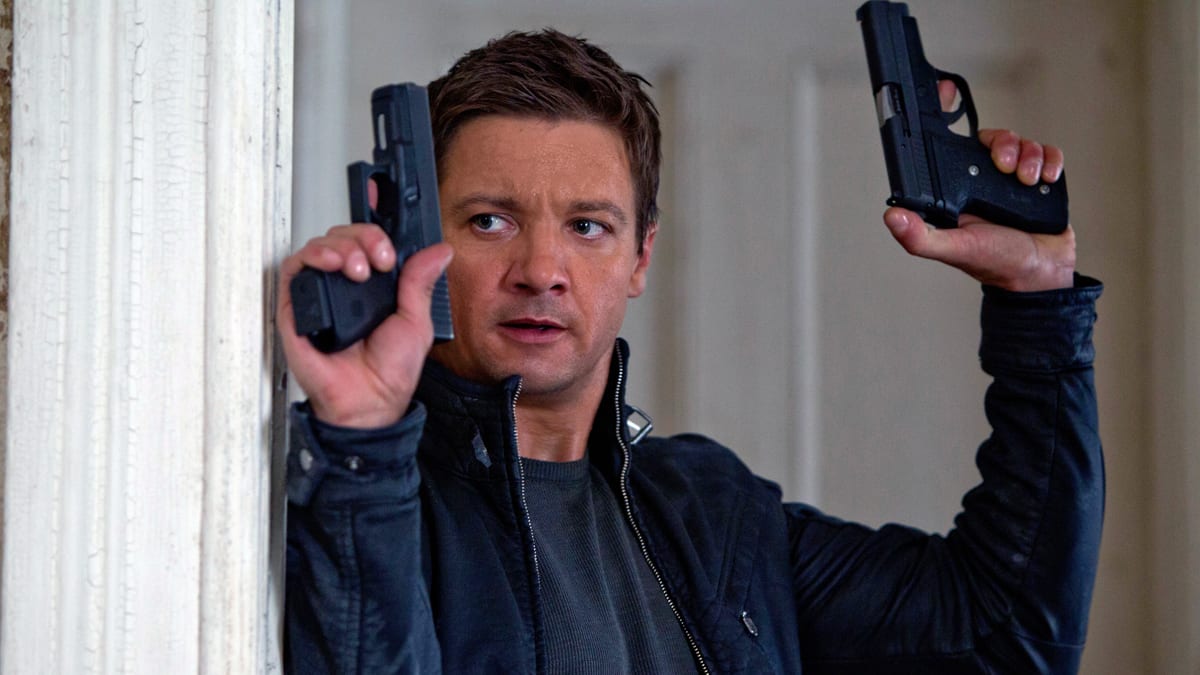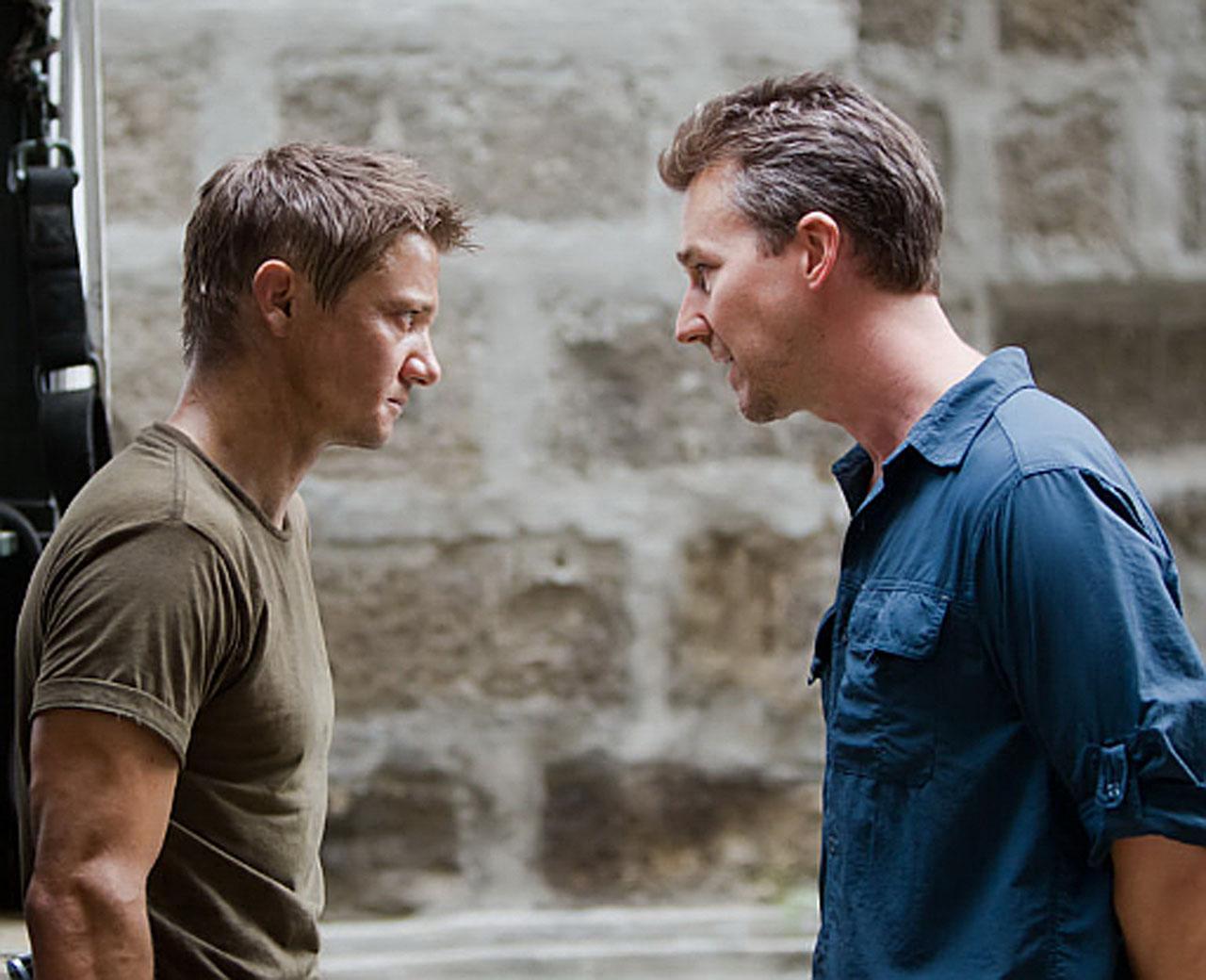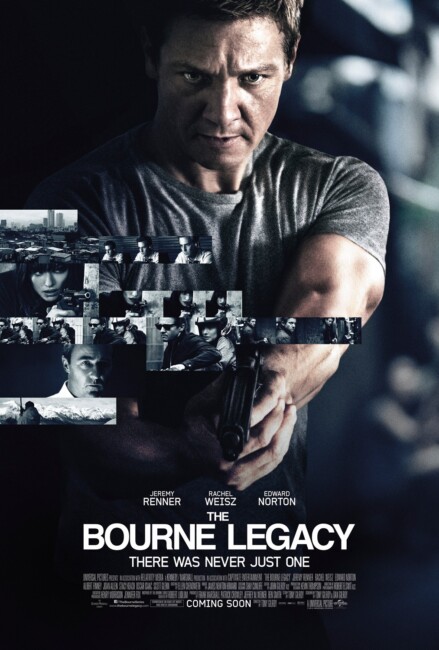Crew
Director/Story – Tony Gilroy, Screenplay – Dan Gilroy & Tony Gilroy, Producers – Patrick Crowley, Frank Marshall, Ben Smith & Jeffrey M. Weiner, Photography – Robert Elswit, Music – James Newton Howard, Visual Effects Supervisors – Hal Couzens & Mike Ellis, Visual Effects – Double Negative, Level 256 (Supervisor – Scott M. David), Lola VFX, Phosphene & Rhythm and Hues (Supervisor – John Heller), Special Effects Supervisor – Garry Elmendorf, Production Design – Kevin Thompson. Production Company – Kennedy-Marshall Productions/Captivate Entertainment.
Cast
Jeremy Renner (Aaron Cross), Rachel Weisz (Dr Marta Shearing), Edward Norton (Eric Byer), Dennis Boutsikaris (Terrence Ward), Oscar Isaac (Outcome #3), Stacy Keach (Admiral Mark Turso), Zeljko Ivanek (Dr Donald Foite), David Strathairn (Noah Vosen), Scott Glenn (Ezra Kramer), Elizabeth Marvel (Dr Connie Dowd), Jennifer Kim (Outcome #4), Albert Finney (Dr Albert Hirsch), Joan Allen (Pamela Landy), Page Leong (Mrs Yun)
Plot
Eric Byer is assigned to eliminate evidence of Operation Treadstone after Jason Bourne’s attempts to expose the program. On his orders, the regular drugs given to all the active Operation Outcome agents are substituted for poison pills. One Outcome agent Aaron Cross is on a training exercise in Alaska and meets his contact, leaving only seconds before the hut and contact inside are blown up by a missile from a drone. Cross goes rogue. He needs another supply of the drugs that all Outcome agents have to take daily. His only connection is Dr Marta Shearing, a geneticist and virologist working for Sterisyn Morlanta laboratories. He goes in search of her, just as she becomes the sole survivor after one of her colleagues goes amok with a gun, shooting everybody in the laboratory. The CIA then seeks to eliminate her. The two of them go on the run, Aaron setting out to find a supply of the drugs. The only hope is for them to head to the production laboratory in Manila but Cross’s activities now have them hunted by the CIA.
The Bourne Legacy was the fourth film in the series that began with The Bourne Identity (2002) from director Doug Liman and starring Matt Damon in the title role, based on the 1980 novel by Robert Ludlum. The film’s success was in taking Ludlum’s book and updating it from the 70s era – Carlos the Jackal was a major nemesis and the Cold War hangs over everything – and creating a spy thriller for the modern day.
The Bourne series took off in a big way with the two subsequent films The Bourne Supremacy (2004) and The Bourne Ultimatum (2007), even though these began to abandon the Ludlum source books and placed their focus on action as opposed to thriller plotting. The directorial reigns in the sequels were inherited by British director Paul Greengrass who gave the films a bulleting kinetic pace – action that was firmly centred around a realism rather than the extravagant fantasy spy capers of the James Bond films – ironically, the James Bond series then began to imitate the Bourne films with their next entry Quantum of Solace (2008).
Following The Bourne Ultimatum, both Paul Greengrass and Matt Damon quit the Bourne series, leaving Universal with a lucrative franchise and no star. The decision was made to deal with this by recasting the part. As opposed to the James Bond series, The Bourne Legacy creates a rationale for this – that Jeremy Renner is another operative from the same behavioural/genetic modification program as Jason Bourne – an idea that borrows from some of the fan speculation about why the Bond series changes faces – that they are all trained operatives who are given the same code name of James Bond.

Here the directorial reigns are inherited by Tony Gilroy who had written all three previous Bourne films, plus other high-profile scripts such as Dolores Claiborne (1995), Extreme Measures (1996), The Devil’s Advocate (1997), Armageddon (1998), Proof of Life (2000), State of Play (2009), The Great Wall (2016) and Rogue One (2016), as well as directed Michael Clayton (2007) and Duplicity (2009). The film borrows the name of The Bourne Legacy (2004), the first in a series of further seven Bourne books that were written by Eric Van Lustbader following Robert Ludlum’s death in 2001, although the film and book share nothing beyond the title.
To keep the franchise going, Tony Gilroy runs with the idea that was introduced at the end of The Bourne Ultimatum where Matt Damon finally found the origin of his identity as part of a CIA behaviour modification program. The film extends on from this – both in terms of its plot, which involves the CIA attempting damage control by eliminating everybody involved with the program, and by assuming that other people were involved in the program and extrapolating from this to follow the adventures of another operative.
This serves to take The Bourne Legacy over from the realm of thriller to borderline science-fiction – where The Bourne Ultimatum dealt with behavioural programming, this adds genetic manipulation to the mix as well. This serves to place The Bourne Legacy into the same realm as other films such as Hitman (2007) and Hanna (2011) or tv’s’Dark Angel‘(2000-2) about genetically-tinkered super-soldiers/spies who are usually involved in plots where they go in search of their identity (and thus falling under this site’s umbrella, which the other Bourne films did not).
The other Bourne films were all good solid entries. I was prepared to give The Bourne Legacy some rope. I have a liking for Jeremy Renner as a result of The Hurt Locker (2008), and he makes a tightly bound and lethally focused replacement for the more boyish Matt Damon. I also had a liking for Tony Gilroy’s first directorial outing Michael Clayton and felt that he had the potential to do something worthwhile with the film.
Alas, The Bourne Legacy dies a slow death on screen. None of it seems to work. For one, Tony Gilroy takes a slow, laidback approach. He makes us wait an entire hour into the film before giving us any of the series trademark gritty handheld fight scenes. This seems a fatal watering down or misunderstanding of the tone and energy of the series. Gilroy does get his act together somewhat after that point during a furious fight/shootout in Rachel Weisz’s house and subsequent set-pieces such as a pursuit around the rooftops of the shantytowns of Manila and a climactic motorcycle chase through the streets. These sequences are competently handled, but pale considerably in comparison to Paul Greengrass’s exhilaratingly kinetic sequences in the previous two films. Furthermore, they don’t feel like organically inserted scenes – more there because the series demands them.

The other main problem with The Bourne Legacy is the story. The Matt Damon films had a great central conflict – an amnesiac agent struggles to find clues about who he is at the same time as being the target of a massive international manhunt. The character of Aaron Cross lacks any of that. Tony Gilroy makes Cross the subject of an international manhunt but at best all he does is turn Jeremy Renner into someone searching for a further supply of his meds.
Gilroy spends a good deal of time in set-up of the story – detailing the way that Edward Norton has all the Treadstone operatives eliminated around the world, an extended scene where Rachel Weisz’s colleague Zeljko Ivanek goes rogue in the laboratory and the CIA’s subsequent attempts to kill her – however, in the end none of this matters to the film. The sole reason these scenes exist is to create some dramatic reason to have the characters on the run and after that the film lacks much interest in following up on them and why these things are happening.
The film climaxes on Jeremy Renner and Rachel Weisz escaping in a motorcycle chase then seen getting away somewhere in the South China Sea with the hint of a romance. However, there is no end to Edward Norton’s manhunt for them, no further exposure of the covert CIA programs. It just seems like an arbitrary ending that has been added because the film has run out of ideas – or at least was wanting to bring things to an end and leave the rest for a subsequent film in the series.
The Bourne Legacy did not prove popular with fans of the series and Matt Damon next returned to the franchise for Jason Bourne (2016).
Trailer here


